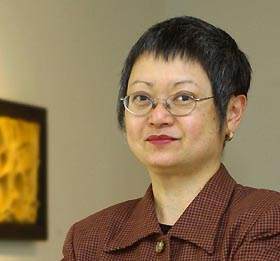|
This is an archived article.
For the latest news, go to the Advance
Homepage
For more archives, go to the Advance Archive/Search Page. |
|||
|
Machida's Appointment in Art History,
Asian Studies a First By Sherry Fisher When Margo Machida left Hilo, Hawaii in 1968 at the age of 17 to start her college career at New York University, the world was in transition. "You can imagine New York at that time," says Machida. The anti-war movement was at its height, feminism was on the rise, and there was a huge flood of Asian migration. Chinatown was a hub of activity and the Asian American cultural movement was growing.
There was a shared sense of mission, Machida says. "In order to make our experiences and perspectives known in the larger culture, we had a responsibility to do the foundational research, to do the writing, to curate the shows, to create the institutions that could be a base from which the voices of the various communities could be heard." Machida has continued to embrace that mission through the years as a New York-based educator, independent curator, researcher, and writer specializing in contemporary Asian American visual art and cultural criticism. Her research and work as a curator focuses on Asian American identities and histories. "Margo Machida is a pioneer in the field of Asian American visual culture," says Roger Buckley, director of the Asian American Studies Institute. "Her joint appointment in art history and Asian American Studies is the only one of its kind in the United States. It's a major step forward in the recognition of Asian American visual culture as a legitimate field." This semester, Machida is teaching a course on "Asian American Art and Visual Culture," which introduces issues of contemporary Asian American identity in art and visual culture. "The course examines how Asian visual artists of different ethnic and generational backgrounds - ranging from recent immigrants and refugees to those born in America - use their art to address and articulate their experiences and histories living in the United States," Machida says. The course explores such themes as migration, labor histories, war, colonialism, gender, and cultural stereotypes. Machida says she was attracted to UConn because of its Asian American Studies Institute and the art history department's interdisciplinary, cross-cultural focus. "They're dealing seriously with the issue of diversity and difference," she says, citing her colleagues' interests in Pacific Studies, Latin American, African, and Chicano art. Machida earned a master's degree in studio art from Hunter College in 1978 and a Ph.D. in American Studies from SUNY-Buffalo this year. From 1997 to 2000, she was an instructor in the Asian/Pacific/American Studies Program and Institute at New York University, where she taught courses on contemporary Asian and Asian American art and social issues. A recipient of a Rockefeller Foundation Fellowship in the Humanities, from 1994 to 1996 Machida was director of the Cultural Dialogue Project, Asian/American Center, Queens College, City University of New York. There she developed interdisciplinary programs devoted to the study of Asian diasporic communities in the Americas. In 1996, she was Madeleine Haas Russell Distinguished Visiting Professor of Non-Western and Comparative Studies at Brandeis University. She also taught at SUNY-Buffalo, where she was a Presidential Fellow; and at the Parsons School of Design and the Cooper Union in New York City. She has lectured at museums, art schools and galleries across the United States and Canada, and is now co-editing a major anthology on Asian American identity and social issues in the visual arts, Fresh Talk/Daring Gazes: Asian American Issues in the Contemporary Visual Arts, to be published by the University of California Press. Machida is a founding member of the recently formed Asian Contemporary Art Consortium in New York City, and is a co-founder of Godzilla: Asian American Art Network. |


